My wife and I have been trying for a baby for a year, and were beginning to face up to the possibility that we needed to get ourselves checked to find out if there was a problem. I was facing up to the question of what life would be like if that problem was with me - it would have been bad enough in my own country, but to live in Korea and be the one responsible for a childless marriage was a burden I didn't know how to bear; my paranoia focused on all those deeply held suspicions that a certain section of society here wants to believe about foreigners. My state of mind not helped by the revelation that our newly-wed friend had become pregnant on their first attempt. If the worst was confirmed, my wife wanted to take the hit for me - recognising how intolerable life might be for me otherwise in this family oriented and foreigner suspicious culture - but to my mind there comes a point where the truth is what it is, and we disagreed, even though I didn't relish the prospect of facing up to Korean Father - or the rest of Korean society - in the worst case.
My wife began to feel unwell a month ago, and the family dog suddenly became very protective of her, biting me twice quite badly. Something was amiss. Was it too much to hope for? Psychic Aunt had proclaimed some time ago that my wife would become pregnant in the Chinese Year of the Ox - she had two months left and we were threatening to picket outside of her home proclaiming her as a bad fortune teller. She came around to the apartment one evening, touched my wife's hand accidentally, and her demeanour changed immediately - "you're pregnant" she said.
One of the problems of being in a foreign country is knowing whether over-the-counter pregnancy tests can be relied upon or not. The first was negative but later turned positive in the bin, and in the coming days the next two went positive straight away. We went to a nearby maternity hospital, where ultrasound scans confirmed a possible pregnancy, but one with complications. So while there was an enormous sense of relief that we weren't necessarily destined to remain childless, there was little happiness to be had in the situation either. While I sat in the waiting room, a woman emerged from her examination distraught, and cried while she fumbled with her phone to make a call. The horror of it all made me feel ill.
All we could do was wait and count off the days on the calendar to the next scheduled scan, but there were complications and we had to rush to the hospital unscheduled. We got through it. Our friends had already named their nascent baby - it being too early to know the sex, the gender-neutral temporary name 'bada' (meaning ocean) was chosen. It's a common practice here to assign names like this but we avoided it.
I was beginning to feel used to sitting around in the maternity hospital, surrounded by rather fatigued looking expectant mothers, young children and the occasional father, but nobody seemed to hold my potentially polluting the gene pool against me. The small children would sometimes walk unsteadily towards me to stare though, one even pointing and screaming. Perhaps they'll grow up to be a Chosun Ilbo journalist. Generally though, I felt isolated, and was glad when we reached a more normal, rather than emergency appointment, where I could go into the doctor's office with my wife. She was still ushered into a small side room though, leaving me left staring at the weighty Korean and English anatomical tomes in the bookcase against the far wall. It was at this point I noticed the screen on the wall to my left was not showing some generic image but was streaming my wife's latest ultrasound from within the room. But it wasn't so much what I saw as what I heard which left me rooted to the spot - a tiny heart beating rapidly. For all I wanted to be cautious and unemotional about what we were going through, hearing that heartbeat made it suddenly seem very real, and I don't think anything prepared me for it.
My wife had been unhappy because she'd seen other women at her stage of pregnancy getting their 'pregnancy diaries' and 'pregnancy certification' from the hospital, the latter of which makes things official with the government, and allows her to obtain a special bank card which provides discounts on medical bills. We were suspicious that mindful of the potential complications, the hospital had tactfully avoided issuing any such documentation to my wife. This week though, she finally got official recognition, and we gradually began telling people.
Korean Father returned from Namhae with a huge arrangement of flowers which now sits in our room, and later he returned from a hospital appointment with a large book - ironically translated from a British original - entitled 'Your Pregnancy Bible'. Curiously, it's full of pictures of a naked British woman showing Korean women what to expect their bodies to look like. My own father had not reacted well to the news that he was going to become a grandfather many years ago, but Korean Father was embracing the idea enthusiastically. I think he was secretly relieved, as we all are, but there is a long road ahead, and the nature of my life in Korea seems destined to change with it.
Sunday, January 31, 2010
Monday, January 18, 2010
Zelig
"Everyone must take part in the beatings."
I'd been out with Korean friends and eight of us wended our way back to one of their apartments. A Japanese Nintendo Wii sat next to the television, but it had been borrowed so nobody knew how to use it. My wife showed them and before long games of Wii Sports Tennis and Baseball were generating considerable competition within the group. There would be a party a week later here, and perhaps aware that ultimately, this was not a truly interactive experience for everyone, attention turned towards discussions of what activities could be organised for the day of the event.
Korean games - and it was decided we should engage in a trial run. So that's how I learned how to play 'Silent 007'. No, really. A person starts off by pointing their finger - as a gun - at one of the other people assembled in a circle. This is the first zero in '007'. Then the selected person points, as the second zero. The designated '7' in this sequence fires the fourth shot - which hits the person pointed to and then - for reasons which aren't clear - the two people on either side of them throw up their hands in shock, or collateral damage perhaps.
Now, if you don't throw up your hands, or if you shouldn't and you do, or if you just make a noise of any kind, you have to place yourself in the centre of the circle to be 'beaten' on the back. And then the game continues at such a rapid pace that mistakes are bound to be made. What the reader makes of this I do not know, but it seems more juvenile written down than it seemed at the time, when it seemed rather juvenile. And this is what groups of Korean thirty-somethings might be getting up to in their spare time. We had a nine-year old girl with us, but I don't think we were playing for her benefit. There was another game, which merely involved number sequences rather than spies, but that involved beatings too.
So I was beaten and I watched the beatings, for which I was eventually admonished. "Everyone must take part in the beatings!" I was warned seriously. And yes, it is a serious business in Korea - conforming. I was a diplomatic incident away from saying something about Korea's former military government or Kristallnacht, but my language skills failed me. I will not be popular here when I learn to speak Korean fluently. It's a major issue. Bad things are going to happen. My wife insists they are not really beatings so much as 'gentle poundings'. Really, she should have entered politics.
Well, in the name of social compliance I tentatively hit people on the back, but still passed on hitting the young girl, so it wasn't long before my non-conformity was highlighted again. "You must hit the girl! You must hit the girl!" Sometimes it takes the company of large groups to remind you just how alone you are.
Sometimes I see foreigners here - especially in the media - who appear to be playing the unwinnable game of trying to be as Korean as the Koreans, and wonder whether they really have drunk the Kool-Aid or more intriguingly, whether they are just human chameleons instinctively blending in for the sake of diplomacy and the avoidance of being on the receiving end of some beatings of their own. I don't want to take part in the beatings, but Korea demands it, so I wonder if I'm really cut out for this.
I'd been out with Korean friends and eight of us wended our way back to one of their apartments. A Japanese Nintendo Wii sat next to the television, but it had been borrowed so nobody knew how to use it. My wife showed them and before long games of Wii Sports Tennis and Baseball were generating considerable competition within the group. There would be a party a week later here, and perhaps aware that ultimately, this was not a truly interactive experience for everyone, attention turned towards discussions of what activities could be organised for the day of the event.
Korean games - and it was decided we should engage in a trial run. So that's how I learned how to play 'Silent 007'. No, really. A person starts off by pointing their finger - as a gun - at one of the other people assembled in a circle. This is the first zero in '007'. Then the selected person points, as the second zero. The designated '7' in this sequence fires the fourth shot - which hits the person pointed to and then - for reasons which aren't clear - the two people on either side of them throw up their hands in shock, or collateral damage perhaps.
Now, if you don't throw up your hands, or if you shouldn't and you do, or if you just make a noise of any kind, you have to place yourself in the centre of the circle to be 'beaten' on the back. And then the game continues at such a rapid pace that mistakes are bound to be made. What the reader makes of this I do not know, but it seems more juvenile written down than it seemed at the time, when it seemed rather juvenile. And this is what groups of Korean thirty-somethings might be getting up to in their spare time. We had a nine-year old girl with us, but I don't think we were playing for her benefit. There was another game, which merely involved number sequences rather than spies, but that involved beatings too.
So I was beaten and I watched the beatings, for which I was eventually admonished. "Everyone must take part in the beatings!" I was warned seriously. And yes, it is a serious business in Korea - conforming. I was a diplomatic incident away from saying something about Korea's former military government or Kristallnacht, but my language skills failed me. I will not be popular here when I learn to speak Korean fluently. It's a major issue. Bad things are going to happen. My wife insists they are not really beatings so much as 'gentle poundings'. Really, she should have entered politics.
Well, in the name of social compliance I tentatively hit people on the back, but still passed on hitting the young girl, so it wasn't long before my non-conformity was highlighted again. "You must hit the girl! You must hit the girl!" Sometimes it takes the company of large groups to remind you just how alone you are.
Sometimes I see foreigners here - especially in the media - who appear to be playing the unwinnable game of trying to be as Korean as the Koreans, and wonder whether they really have drunk the Kool-Aid or more intriguingly, whether they are just human chameleons instinctively blending in for the sake of diplomacy and the avoidance of being on the receiving end of some beatings of their own. I don't want to take part in the beatings, but Korea demands it, so I wonder if I'm really cut out for this.
Wednesday, January 13, 2010
In the Glass Box
A phone box near our apartment was vandalised earlier this month, and you could tell this was something a little unusual by the fact that people - especially the elderly - were stopping to stare at it as they walked by. I come from a heavily vandalised country - I'm referring to property defacement by individuals in this case rather than the actions of successive governments - so it wasn't anything worth a second glance to me, except that I realised how out of context it seemed, because now I come to think of it I don't think I've ever seen anything here so deliberately vandalised before.

Does it tell you something about living here that I was suddenly a very self-conscious foreigner, mentally willing the locals not to look in my direction? Perhaps I've been exposed to the Korean media for too long. Foreigners - crime - foreigners - crime foreigners - crime...
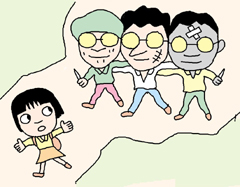
A young Korean girl flees some evil foreigners in this Chosun Ilbo story
The KT phone boxes in question are actually outside a medium-sized local KT office, so I suppose one mustn't rule out the possibility that it may be an antagonised customer or disgruntled employee...

Does it tell you something about living here that I was suddenly a very self-conscious foreigner, mentally willing the locals not to look in my direction? Perhaps I've been exposed to the Korean media for too long. Foreigners - crime - foreigners - crime foreigners - crime...

A young Korean girl flees some evil foreigners in this Chosun Ilbo story
The KT phone boxes in question are actually outside a medium-sized local KT office, so I suppose one mustn't rule out the possibility that it may be an antagonised customer or disgruntled employee...
Thursday, January 07, 2010
What's Cookin'?
 When I was asked if I wanted to attend a 'non-verbal' performance vaguely themed around the idea of cooking for a Korean wedding, it didn't exactly sell me on the idea although I agreed to go. As I gathered it might involve - amongst other activities - drumming with kitchen equipment, my interest was piqued; I'd been to a taiko performance in England and really enjoyed it.
When I was asked if I wanted to attend a 'non-verbal' performance vaguely themed around the idea of cooking for a Korean wedding, it didn't exactly sell me on the idea although I agreed to go. As I gathered it might involve - amongst other activities - drumming with kitchen equipment, my interest was piqued; I'd been to a taiko performance in England and really enjoyed it.What I didn't appreciate at the time was that the performance, called 'Nanta', is practically a Korean institution - having premiered in 1997 the show is still running twelve years later, and was apparently at some point designated as one of the top ten tourist attractions in Seoul. More than that, it's expanded - there are currently four Nanta troupes, one of which has been on Broadway since 2004. There are regular tours outside Korea - where it's often called Cookin' rather than Nanta. Clearly, it's run so long that individual performers come and go, and the show is its own mini-industry. Described as a combination of samul nori drumming and music mixed with comedy, pantomime and audience participation. But it isn't without controversy - with at least one Korean samul nori artist considered a national treasure in this country denouncing it as something of an affront to tradition.
Not particularly wishing to end up on the stage at some point, we'd carefully chosen seats a little further back from the front in the middle which proved to be a wise move. I'd counted three other foreigners in the audience near the front, and two of them ended up in front of everyone before the end. I've noticed that Koreans really like audience participation - and it features in a lot of these types of event. I couldn't help but wonder if the jokes were the same every time though.
In spite of the supposedly 'non-verbal' nature of the show, it actually did have some speaking - a mix of English, Korean and nonsense. It didn't greatly impact on the enjoyment, but a little of the meaning at certain points was lost due on me to the language difference. In the end, I'm not sure anyone's really there for the story though, it's all about the spectacle, and there's none greater than when the performers frantically drum on a variety of surfaces with a variety of implements - at times it really is a sight to behold as the noise thunders around the auditorium.
Photos are not allowed, but below is the promotional video on Youtube. While it tends to concentrate on the drumming parts of the show, this probably only represents about half of the performance, the remainder being a mix of non-verbal comedy and audience participation.
Friday, January 01, 2010
Last Sunset
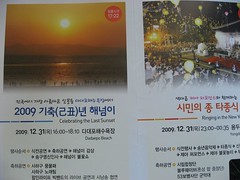 Cold. That will be my overriding memory of the 2010 Busan New Year Festival.
Cold. That will be my overriding memory of the 2010 Busan New Year Festival.The weather was the top subject on the news, with temperatures in Seoul dropping to -12.8°C, and it feeling like -20°C with the wind chill factor. Busan had predictably fared better, with daytime temperatures ranging from -10°C to -5°C, but we also had a wind chill factor to deal with. Heavy snow had fallen in a number of regions, but in the almost perpetually dry air of Korea's second biggest city, the atmosphere was perfectly clear and the only ice to be seen was in the frozen trickles of water and effluent discarded from the occasional shop-front.
With overnight temperatures predicted to fall to -15°C, there were three activity options encompassed within the official Busan New Year Festival - 'Celebrating the Last Sunset' of 2009 at Dadaepo Beach between 4pm and 6.10pm, 'Ringing in the New Year' at Yongdusan Park between 11pm and 12.35am, and 'Celebrating the First Sunrise' of 2010 on Haeundae Beach between 6.30am and 8am. There was also a fourth option - traditionally Korean and outside any official event - climb a mountain for one-and-a-half hours to watch the sunrise - between around 4.30am and 8.30am, an activity so ill-advised it annually claims casualties even in less treacherous weather; the combination of alcohol, strenuous exercise, cold, narrow paths and near total darkness never being a good idea.
I'd already had the Haeundae Beach New Year experience three years ago, and while it certainly was an experience just over two months into my Korean life, it was one I was agnostic about repeating. In any case, the forecast was for cloud the next morning. Again. So I opted for 'Celebrating the Last Sunset' at Dadaepo Beach, on the grounds of temperature as much as anything. Despite the deceptively clear and sunny day, it was still so cold that one could rapidly begin to lose feeling in fingers and toes.


With no subway station, we arrived by taxi - a little late after heavy traffic - and activities were already under way. A samul nori troupe played on Fountain Square and people wrote their wishes for the New Year on a large message wall, though it is unclear what the person who had - in English - inscribed "I believe I can fly" was exactly hoping for. Someone else had apparently written their mobile phone number - perhaps making their aspirations a little easier to guess at.
A quick scan of the horizon soon revealed the obvious flaw in the Busan government's cunning plan. While the city enjoys some coastal areas to the west where the sun sets, Dadaepo Beach's Western horizon was not ocean-filled, but rather mountainous. While the official guide indicated the sunset time at 5.22pm, this would presumably be a little later than it would disappear from view where we were, which seemed to make the experience more arbitrary than it should have been.


Tents to one side of the Square served hot drinks for free, and dispensed Swine 'Flu advice to anyone feeling ill. Inside another tent the Post Office gave out pre-stamped postcards which people could use to write messages before posting them into a giant postbox. On the Square, large outdoor heaters had been strategically placed around a seated area, and people were wisely beginning to strategically place themselves next to them. It was bracingly cold with a healthy wind blowing in from the sea.
A jazz band began to play on the stage, and that seemed like a good plan - what better way to play down the sunset than with some soulful music? But before long they'd switched through various styles to settle into the type of tune popular with Korea's older generation. Gratingly, some began to sing. The band gave way to a Korean drumming performance, which transpired to also be a good accompaniment to the setting sun. Unfortunately, views of the stage were somewhat obscured by the arrival of the Mayor of Busan in front of me, whom then preceded to enjoy a steady stream of visitors offering tribute, standing up.



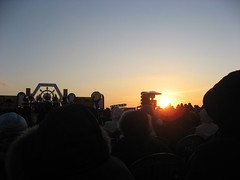
As the sun set many in the crowd unceremoniously dashed over to the edge of the Square to bid good riddance to one of the worst decades in recent memory. Evidently more still had foregone the music in favour of a more reflective view of the event from the shoreline.
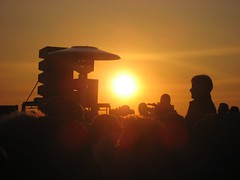

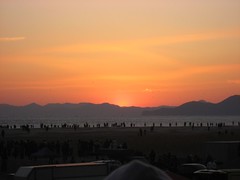

By this time, my toes had long since stopped reporting in, and the anti-shake on my camera was fighting a losing battle against my gloved but increasingly quivering hands. My wife and I sought shelter in a tent which transpired to have the best kept secret at the event - a portable gas fire where people shamelessly removed shoes in a futile attempt to avert the onset of frostbite.
The event ended with fireworks, which exploded above us for our entertainment while beneath our feet the lights of the Square changed colour in some vague synchronisation with the accompanying music. I'd seriously considered leaving after the sunset, mostly because of the cold but with an increasing concern as to how we were going to fight with 500 people for a taxi once the event finished, but stuck it out to the end.
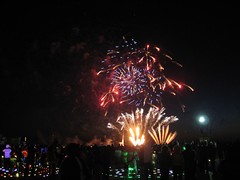



This was a mistake. Predictably, the moment the burning remnants from the last firework faded into the cold night sky, a mass of people moved from the Square to the road as though they were held together by some invisible force, which one sometimes suspects they actually are here. The police cunningly waved us down the path adjacent to the road rather than have us spill out into it in searching for rescue vehicles, so it appeared as though we had something of a walk ahead of us, on feet we could no longer feel. But twenty meters further along, a taxi appeared out of a dark side street as though it had been conjured up out of thin air. This highly improbable and near Biblically-miraculous event seemed to freeze the miserable masses around us to the spot momentarily, so it became our ride home.
Or at least, that was the theory. A friend had phoned to warn us that it had just taken her thirty minutes to drive a mile in our area, and sure enough it wasn't long before we encountered the heaviest traffic jams I've ever seen in this city - and there was much to compare it to. Our progress became slower and slower, while the taxi meter - being based on movement and, crucially, time - ticked higher and higher. We discussed in English how far we could let things go before financial prudence demanded that we abandon the pervasive warmth of the vehicle and set out on foot in an unfamiliar district far from the navigable comfort of the nearest subway station. Even our driver saw the futility of the situation and volunteered to let us out whenever we wanted to go. Somehow though, we saw it through most of the way before our stop-loss kicked in and we were forced to hit the streets less than a mile from our home. I still hadn't completely warmed up.
Subscribe to:
Comments (Atom)